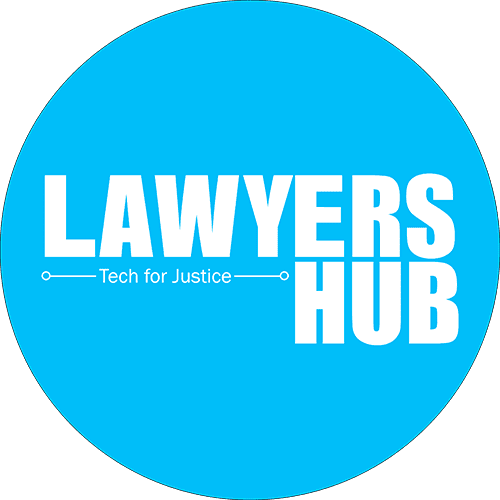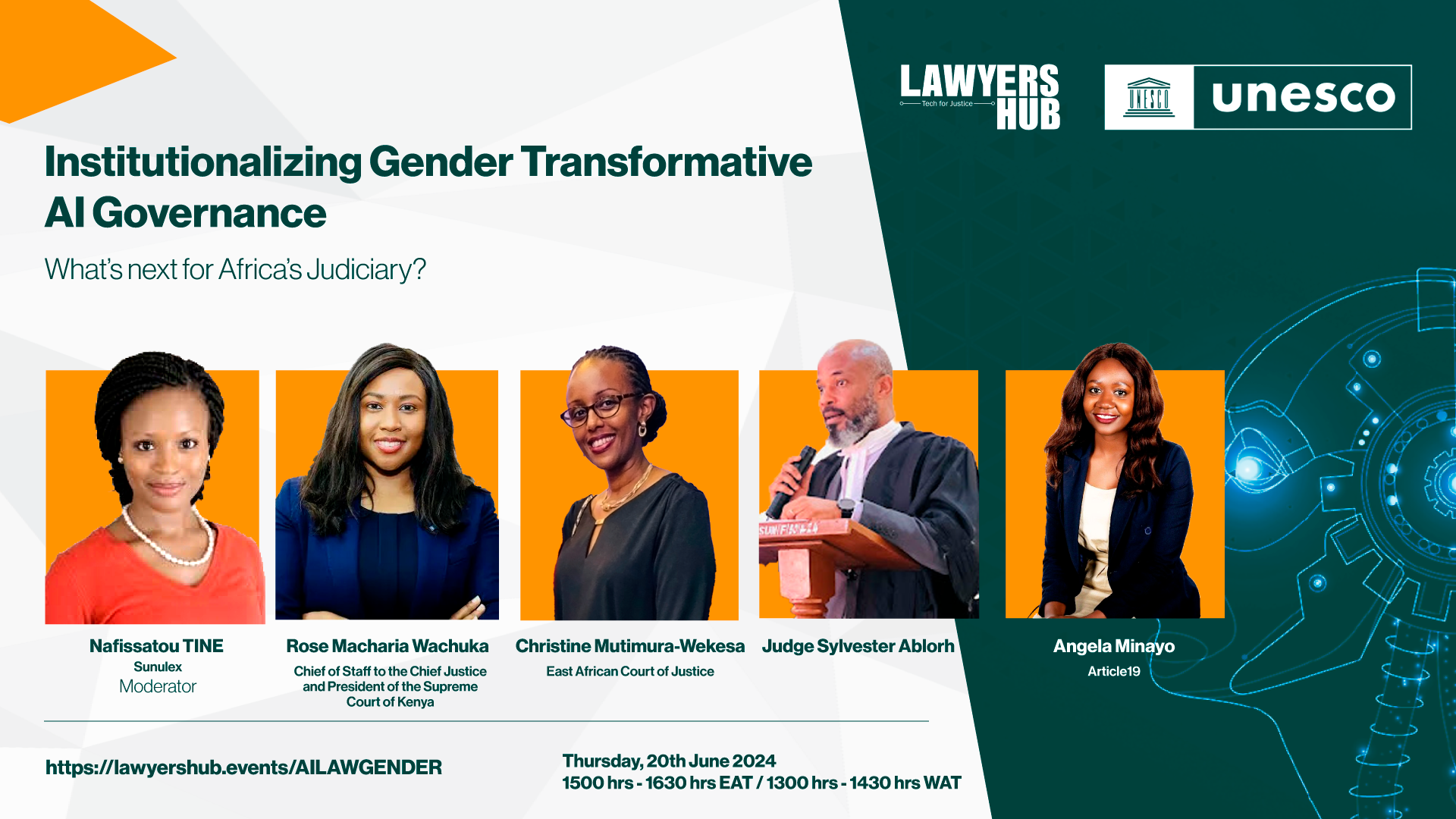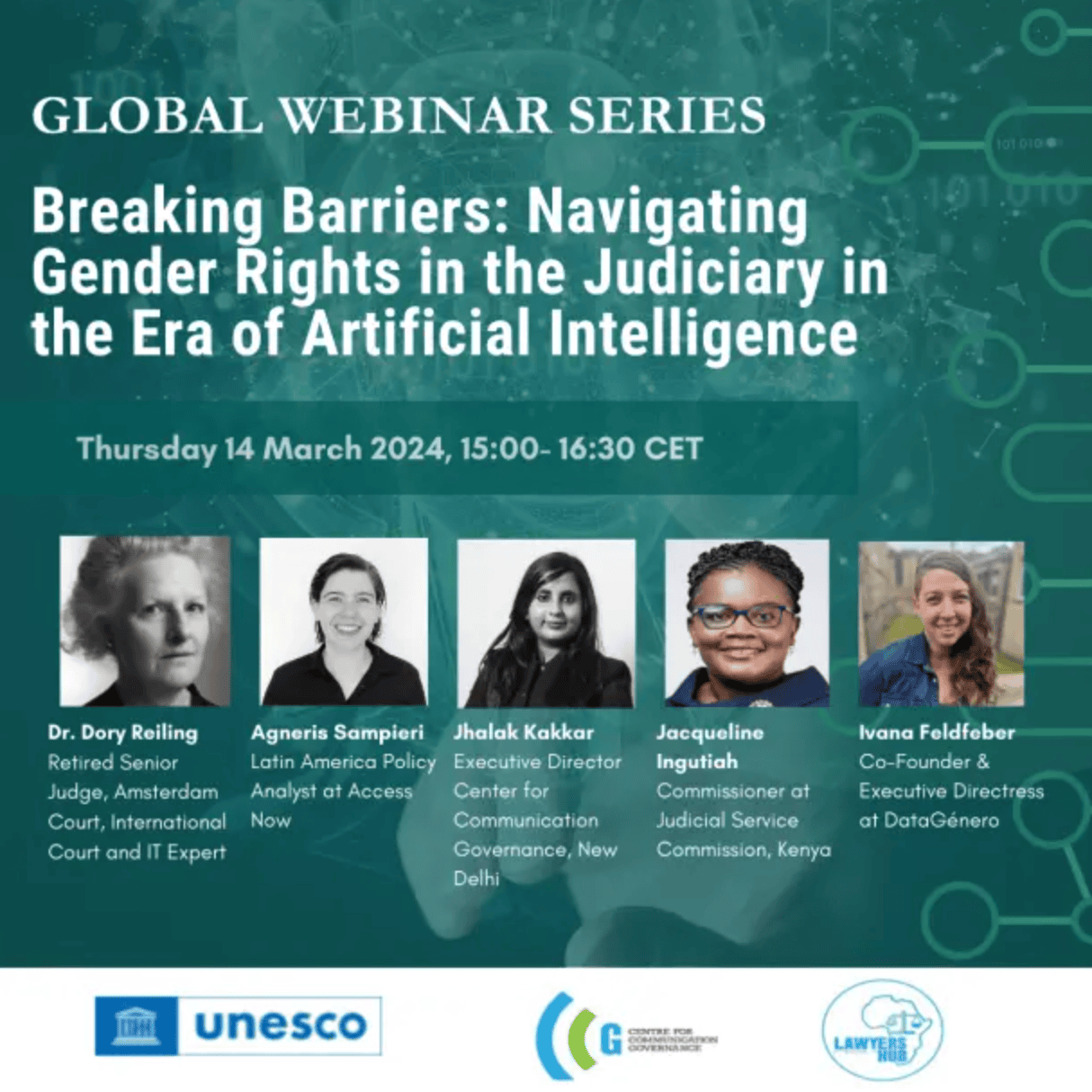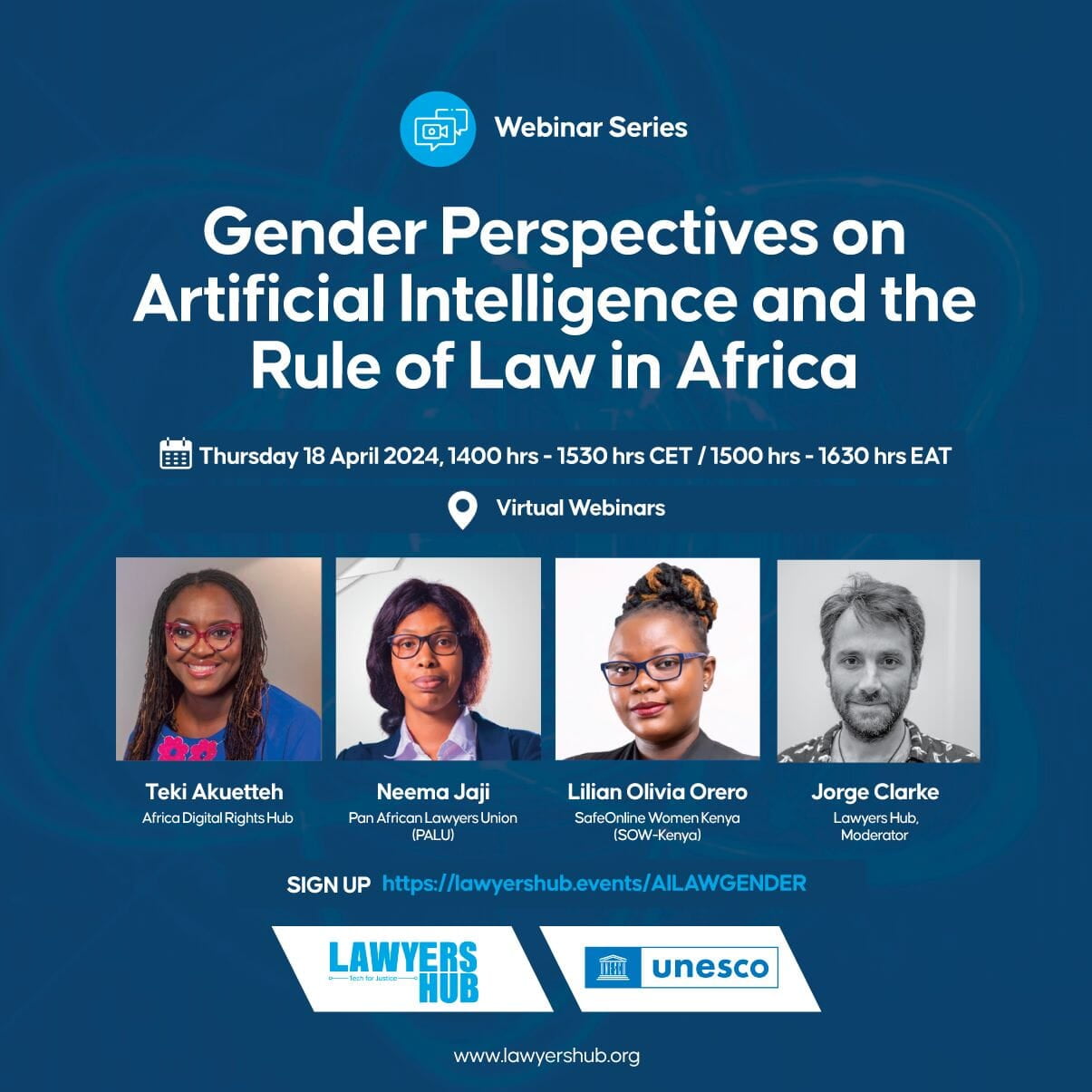Institutionalizing Gender-Transformative Artificial Intelligence Governance Within Africa's Judiciary
On June 20, 2024, the Lawyers Hub, in partnership with UNESCO (HQ and East Africa office), hosted a webinar on institutionalizing gender-transformative AI governance within Africa's judiciary. Speakers included, Angela Minayo from Article 19, Rose Macharia Wachuka, Chief of Staff to the Chief Justice of Kenya, Christine Mutimura, Deputy Registrar of the East Africa Court of Justice and Judge Sylvester Ablorh from Ghana. Moderated by Nafissatou TINE from Sunulex.
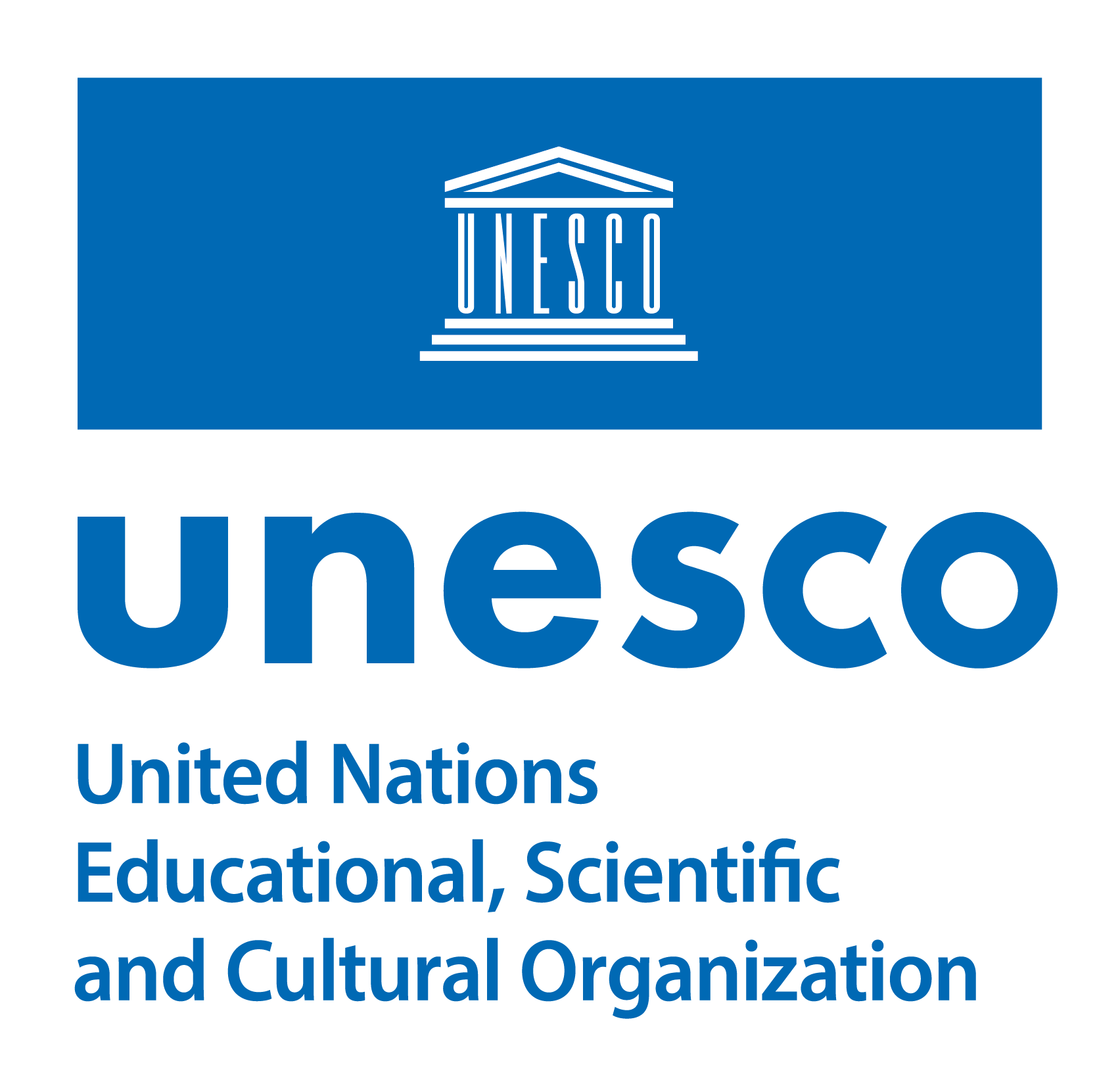
Breaking Barriers: Navigating Gender Rights in African Legal Landscapes
Lawyers Hub, in partnership with UNESCO (East Africa office), hosted the 2nd webinar from the Gender, AI, and Law in Africa series themed "Breaking Barriers: Navigating Gender Rights in African Legal Landscapes" on 23rd May 2024. Speakers included Christine Okeno, Jacqueline Ingutiah, Favour Borokini, and Hlengiwe Dube, with Maria Mbeneka as the moderator. This article highlights the key findings and recommendations from the webinar. The event began with presentations from the speakers, followed by a panel discussion, and concluded with a question-and-answer session.

Gender Perspectives on Artificial Intelligence and the Rule of Law in Africa
Lawyers Hub, in partnership with UNESCO (HQ and East Africa office), hosted a webinar themed "Gender Perspectives on Artificial Intelligence and the Rule of Law in Africa." on April 18 2024. The speakers were Teki Akuetteh, Neema Jaji, and Lilian Olivia Orero, the moderator was Jorge Andrés Clarke De la Cerda. This article outlines the key elements of the discussion, speakers' perspectives, and recommendations. As highlighted by Sharmaine Koh in the keynote presentation, this type of dialogue is necessary for the healthy development of legal and technological landscapes in Africa...

Catalyzing Artificial Intelligence for Women’s empowerment in Africa
Artificial Intelligence (AI) has the potential to transform societies, offering new opportunities for economic growth and innovation. However, its benefits are not equally distributed, especially for women in Africa. To better promote policies that catalyze AI's potential for women's empowerment while mitigating its risks and challenges, it is crucial to understand the current landscape and identify key areas for intervention. This article will offer findings and recommendations on how the African continent can leverage AI technologies and applications to enhance access to education, healthcare, economic opportunities, and other areas that can contribute to women's empowerment in the region.

Dickson Ogugu
Dickson Ogugu
Lawyers Hub
Lawyers Hub
Truecaller Not a Data Controller says the Nigerian Federal High Court
"Truecaller is not a data controller," says the Nigerian Federal High Court. Following a case filed in the court in 2019, Judgement delivered on 19th April 2023, the court stated that the phone owners (users) are the data controllers. Truecaller did not unilaterally collect or harvest the phone numbers of the applicants; rather, it is the data controller who gave consent and access to these phone numbers.
Without the action of the data controllers, Truecaller would have no access to the applicants' personal details. The court ruled that Truecaller does not operate as a data controller or harvester of phone numbers.

Dickson Ogugu
Dickson Ogugu
Lawyers Hub
Lawyers Hub
The Lawyers Hub celebrating Safer Internet Day 2024: Inspiring Change in the Digital World
Safer Internet Day, initiated by EU Safe Borders in 2006 and later adopted by the Insafe Network of Awareness Centers, was designed to emphasize the importance of internet safety and promote responsible use of digital technology. Today, Safer Internet Day, celebrated annually on February 6th, transcends geographical boundaries, rallying countries worldwide to foster online safety and responsibility.
The theme for Safer Internet Day 2024, “Inspiring Change. Making a difference, managing influence and navigating change online,” calls for active participation in creating a safer digital environment. It encourages individuals to leverage their influence positively and adapt to the dynamic nature of the online world. This theme underscores the importance of collective action in fostering a culture of safety, respect, and empathy online...

Dickson Ogugu
Dickson Ogugu
Lawyers Hub
Lawyers Hub
Implementing a Digital Identity System in Kenya: Lawyers Hub convenes with the Ministry of Interior and CSOs at a Consultative Breakfast Meeting on Kenya’s ‘Maisha Namba’ Digital Identity Program

Lawyers Hub
Lawyers Hub
Policy Mondays; A discussion on the use of Technology in Africa’s elections.
The discussion was centered on the experiences of Kenya and Nigeria, offering a compelling case study for attendees from across the African continent and beyond, attesting to the importance of the topic. Beginning with a comprehensive overview of the electoral evolution of African countries since independence; particularly Kenya and Nigeria. The Lawyers Hub highlighted the significant transformation from traditional analog/manual systems to modern technology-enabled approaches.
After the highlights, an online poll was done; Majority of the participants trusted the outcome of the elections conducted using technology with a near split between those who knew where the technology used in their elections was procured from and those who did not. A minority of the participants knew how the data they provided during elections is stored with the majority yielding to the notion that technology supports democracy in Africa...

Lawyers Hub
Lawyers Hub
REMEDIES FOR INFRINGEMENT OF THE DATA PROTECTION ACT 2019: Understanding Penalty Notices, Enforcement Notices, and Administrative Fines
The Office of the Data Protection Commissioner (ODPC) recently issued penalty notices against three data controllers/processors in the entertainment, finance and education sectors. In the process of coverage, there has been a reference to ‘fines,’ ‘penalties’ and even ‘punishment’ in relation to the actions of the ODPC in issuing the Penalty notices. However, it should be noted that the first of such penalty notices was issued by the ODPC in 2022, as can be read here. This feature provides guidance on the types of remedies anticipated under the Data Protection Act 2019 (DPA).
Filing Complaints
An aggrieved person (data subject) may lodge a complaint with the Data Commissioner, where there is an alleged violation of the DPA. The complaint is submitted online through a complaints portal, providing particulars and evidence of infringement. The complaint must include specific details as outlined by the Data Commissioner....


